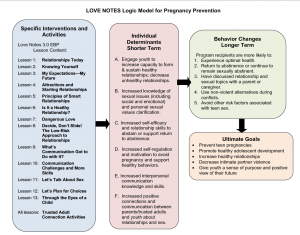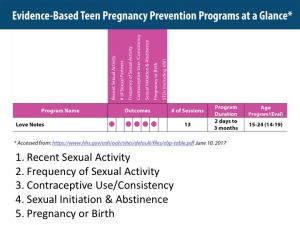2/20/2020 This site page is continuously monitored and updated as new information becomes available. Please check back frequently for the most up-to-date information.
The Office of Population Affairs has released the following Cooperative agreement, Optimally Change the Map of Teen Pregnancy through Replication of Programs Proven Effective (Tier 1) Submission deadline is April 27, 2020.
The goal of this Funding Opportunity Announcement (FOA) is to have a significant impact on improving the optimal health of adolescents and reducing teen pregnancy and sexually transmitted infections (STIs) through saturation of communities with the greatest needs and disparities using a systems thinking approach to replicate effective programs with fidelity.
The goals of this FOA will be realized through:
1) Ensuring areas of greatest need are targeted in an effort to promote equity in reaching optimal health and preventing teen pregnancy and STIs.
- Love Notes Evidence Based Program Model is the ONLY program on the federal OAH list with five positive outcomes and no negative outcomes.
(Love Notes 3.0 SRA EBP is also available for those who believe a sexual risk avoidance approach is more applicable for their community.) - Compared to the control group, Love Notes students were 46% less likely to become pregnant.
- Love Notes was written for young people with the greatest needs.
2) Utilizing a systems thinking approach to identify multiple leverage points to maximize impact on promoting optimal health and preventing teen pregnancy and STIs.
Let us help you think about how to reach these leverage points in your system:
- Parents/Caregivers – Trusted adult connections in each lesson; introduce them to key concepts of Love Notes
- Staff and partners – Utilize Mind Matters to assure trauma informed approach and implementation
- Utilize Love Notes to maximize impact on youth through community and systems messaging through posters, PSA’s, and the like.
3) Replicating with fidelity effective programs and supportive services that are culturally appropriate, age appropriate, medically accurate, and trauma-informed.
Love Notes EBP:
- Has been successfully used with youth in varied cultural settings.
- Was developed for youth ages 14 and up. (NOTE: Many of our clients see a need for Love Notes with younger youth. Based on their requests, we will issue new guidance beginning July 1, 2020 on how to adapt Love Notes EBP to youth in grades 6-8.
- Was updated in 2019 with the most current medical information based on feedback from the Family and Youth Services Bureau, using CDC and YRBS data.
- Utilizes a trauma informed approach to acknowledge trauma and resist retraumatization.
Consider Mind Matters: Overcoming Adversity and Building Resilience – for your staff and partner professional development.
4) Applying the power of youth and community voice to ensure the project is of the highest quality and best fit for the community(ies) and population(s) to be served.
- Love Notes EBP utilizes a positive, asset based approach.
- Love Notes is used effectively in a wide variety of settings.
- Love Notes allows you to provide opportunities for youth leadership.
5) Monitoring, evaluating, and improving the project and using key performance measures to document the project.
- Love Notes clients gain access to our full range of fidelity tools and evaluation measures.
- After a Dibble training, clients are encouraged to schedule two hours of complimentary implementation Technical Assistance or training follow-up.
6) Communicating and disseminating information, successes, lessons learned, and knowledge.
- We invite TPP Grantees to share their success and lessons learned through our monthly newsletter and webinars.
- We also support clients’ workshop presentations at relevant conferences.
Scroll down to see Toolkit.
You may find the following tools useful as you build your application:
- Citation and Abstract of Study
- Issue Brief
- Logic Model
- Theory of Change
- Reports and Webinars
- Populations and Settings
- TAG Correlation
- Outcomes
- Fidelity Tools
- School Saturation Model
- Dissemination
- Training Expectations
- Professional Development
- Technical Assistance
- Training Supply List
- Price List
- Budget Plan
- Memorandum of Understanding (MOU)
- Additional Resources
Citation and Abstract of Supporting Research Study Citation:
Barbee, A. P., Cunningham, M. R., van Zyl, M. A., Antle, B. F., & Langley, C. N. (2016). Impact of Two Adolescent Pregnancy Prevention Interventions on Risky Sexual Behavior: A Three-Arm Cluster Randomized Control Trial. American journal of public health, 106(S1), S85-S90.
Abstract:
Objectives. To test the efficacy of Reducing the Risk (RTR) and Love Notes (LN) on reducing risky sexual behavior among youths yet to experience or cause a pregnancy.
Methods. The four dependent variables were ever had sex, condom use, birth control use, and number of sexual partners at 3- and 6-month follow-up in a 3-arm cluster randomized controlled trial of 1448 impoverished youths, aged 14 to 19 years, in 23 community-based organizations in Louisville, Kentucky, from September 2011 through March 2014.
Results. At 3 and 6 months, compared with the control condition, youths in RTR reported fewer sexual partners and greater use of birth control. At 6 months, LN participants reported greater use of birth control and condoms, fewer sexual partners, and were less likely to have ever had sex compared with the control condition.
Conclusions. We provided additional evidence for the continued efficacy of RTR and the first rigorous study of LN, which embeds sex education into a larger curriculum on healthy relationships and violence prevention.
Click here for a pdf file of the Love Notes Theory of Change
Love Notes – Theory of Change
A. Intentionality via the Theory of Planned Behavior. The theory of planned behavior was used to develop Love Notes. A guiding principle behind the theory of planned behavior is that increasing the likelihood of forming a behavioral intention can, in turn, lead to behavioral change. There is a strong relationship between behavioral intentions and actual behaviors.
In accordance with the core constructs of this theory, Love Notes seeks to impact the following three aspects of an individual in order to increase the likelihood of that individual forming a behavioral intention:
- Knowledge and beliefs that shape attitudes about the likely consequences of risky sexual behaviors and unhealthy relationships. This is provided by lectures, video clips, and group exercises that provide information on the reproductive system, contraception, and pregnancy,
- Perceptions one has about the normative expectations of others around her/him regarding risky sexual behaviors and unhealthy relationships. This is provided through lectures, video clips, and group exercises that increase the youths’ knowledge of the thoughts, opinions, and actions of other youth, and
- An increase in one’s confidence in his/her ability to perform a particular behavior (perceived behavioral control/self-efficacy, i.e. I can do it). This is provided through lectures, video clips, and group exercises that are intended to increase the youths’ enthusiasm, agency, and self-efficacy
Thus, a youth’s maladaptive beliefs and attitudes about relationships and the consequences of risky sexual behaviors can be changed if exposed to an intervention that offers new information that helps the individual alter their perception of social norms and optimal behavior in relationships. This information needs to be bolstered with plenty of real and believable scenarios as well as culturally relevant examples from multiple kinds of presentations—visual, audio, oral, and kinesthetic. Offering skills for protective sexual health behaviors and healthy relationship formation and maintenance, along with clear frameworks to make decisions and specify intentions, should strengthen behavioral intentions as well as the confidence to change actual behaviors (self-efficacy).
B. Success Sequence via Cognitive-Behavioral Theory. In Love Notes, a cognitive behavioral approach is added to the Theory of Planned Behavior. Cognitive behavioral theory is the idea that the way we think about situations can affect the way we feel and behave. In particular, negative thinking patterns start early in life. So, if an intervention can help a participant identify and challenge negative thinking patterns and behaviors, it can potentially change the way that person feels about situations and enables them to change their behavior. The intervention may help participants look at what is going on now in their life as well as look at their past and think about how their past experiences impact the way he or she sees the world and in turn help participants clarify behavioral intentions and future behaviors. One important framing component in Love Notes is the success sequence, which allows youth to concretely plan so as to maximize their ability to reach life goals for self-sufficiency and connection.
C. Compassion via Empathy Model of Altruism. A conceptual framework developed by the author, dubbed Through the Eyes of a Child, strengthens and reinforces pregnancy prevention efforts using a unique approach in motivating young people to avoid an unplanned pregnancy. Rather than only focus on a youth’s self-interest, it also includes a focus on a child the youth may have now (as a part of secondary pregnancy prevention programs) or in the future (as a part of primary pregnancy prevention programs). Young people are invited to deeply consider what an unplanned pregnancy means and feels like to a child. This is consistent with Daniel Batson’s Empathy Model of Altruism. Through a series of activities, youth explore the consequences of unplanned pregnancy within unstable and/or troubled parental relationships from the perspective of a child. Some participants may remember their own childhoods of instability and not want to repeat that. This shifting of the center of consideration to that of a child versus one’s selfinterest sparks compassion and increases motivation to take the actions necessary to avoid unplanned pregnancy.
D. Intentionality via Planning. As Kathryn Edin, Ph.D. found in her work, Promises I Can Keep: Why Poor Women Put Motherhood Before Marriage and more recently Doing the Best I Can: Fatherhood in the Inner City, while all young people want a good life for their child, there is a lack of understanding about the connection between their child’s welfare and their parents’ love choices and love lives. As participants come to understand the other stakeholders (their children) in their relationship and sexual choices, there is an increase in motivation. This approach also reinforces the importance of Intentionality. That is expressed in terms of planning and not drifting, a term used by Isabel Sawhill, President of the National Campaign to Prevent Teen and Unplanned Pregnancy and author of Generation Unbound, as well as Scott Stanley’s sliding vs. deciding concept, both of which are used in Love Notes. Within this framework, youth address issues of father absence and father involvement, co-parenting whether together or apart, and early childhood development needs.
E. Avoidance of Coercive Relationships via Michael Johnson’s Multidimensional Model on Intimate Partner Violence. Relationship aggression is common. For those 18 years of age and over, according to the Centers for Disease Control and Prevention, nearly one in three women (29%) and one in 10 men in the U.S. have experienced rape, physical violence and/or stalking by a partner, and report a related impact on their functioning.2 The 2013 Youth Risk Behavior Survey (CDC) found that among the 74% of high school students who dated or went out with someone in the past 12 months, 10.3% reported physical dating violence.3
The literature on intimate partner violence (IPV) makes distinctions between types of relationship aggression. Michael Johnson, a leading researcher in the field, as well as others, makes a distinction between coercive control violence (also known as intimate terrorism) and situational couple violence. 4 Coercive control violence or intimate terrorism refers to couples in which there is a clear batterer who threatens, controls, and holds power over a partner who is a victim. The central motivation is control of the partner. This kind of aggression escalates over time and is more likely to include serious injury or homicide than situational violence. Situational couple violence is more common (Johnson & Leone 2005) and especially so for youthful populations. In this type of relationship aggression, both partners typically engage in physical aggression that stems from poor impulse control and conflict resolution skills rather than from the more pathological, controlling personality traits.
Although females typically suffer more severe consequences than males, females also perpetrate aggression within intimate relationships in this type of intimate partner violence. In Love Notes, situational couple violence is referred to as “arguments-that-get-physical.” Warning signs of unhealthy and violent relationships, including those that are terroristic in nature is included in the curriculum as well. There is an emphasis on the fact that any form of aggression is unacceptable, since abuse is associated with physical and emotional harm. Both types of violence are clearly important to explain.
The benefit of presenting the Johnson model of both coercive control violence/intimate terrorism and situational couple violence is that it makes the content on relationship aggression applicable to a wider audience. Too often, interventions and prevention programs focus on coercive control violence/intimate terrorism as defining all or most relationship aggression. If the intervention discussed aggression only in the context of one partner being a controlling batterer and the other a victim, participants who experience situational couple violence or who sometimes act aggressively themselves might feel the information was not relevant to them or based on common reality. They may conclude the discussion doesn’t apply to them, yet for most youth involve in intimate partner violence it does.
By presenting both types and the range of associated behaviors, participants can better understand that no aggression is acceptable. Both are clearly important to prevent and exit out of safely because any form of aggression is unacceptable and can be associated with serious harm and negative outcomes.
Love Notes educates youth on how coercive control violence can start and progress from the very first signs of disrespect, the impact it can have on a victim, the signs of greatest danger, and how/where to get help, as well as safety planning and leaving in ways that minimize risk of harm. It also educates on situational couple violence—from the early warning signs, to the harm and negative outcomes, to where/how to access additional help and resources. Love Notes teaches youth ways to de-escalate arguments, regulate emotions, take time-outs and builds skills for talking through difficult or conflict-laden issues safely so as to collaboratively problem solve and reach mutually beneficial resolutions. Participants learn and practice a set of evidence-based communication and conflict management skills. Love Notes also explores the kinds of harm to children from both types of relationship aggression. A central message is to draw the line of respect at the first sign of disrespect.
1 (Kathryn Edin was a consultant with Pearson’s co-authors Scott Stanley and Galena Kline Rhoades on Within My Reach.)
2 Centers for Disease Control, Understanding Intimate Partner Violence, Fact Sheet 2014. Retrieved: http://www.cdc.gov/violenceprevention/odf/ipv-factsheet.pdf
3 Youth Risk Behavior Survey summary 2013: http://www.cdc.gov/mmwr/preview/mmwrhtml/ss6304a1.htm?s_cid=ss6304a1_w
4 Hardesty, J. L., Crossman, K. A., Haselschwerdt, M. L., Raffaelli, M., Ogolsky, B. G., Johnson, M. P. (2015). Toward a standard approach to operationalizing coercive control and classifying violence types. Journal of Marriage and Family. doi: 10.1111/jomf.12201
Evaluation of Love Notes and Reducing the Risk in Louisville, KY
Cunningham M. R., van Zyl, M. A., & Borders, K. W. (2016). Evaluation of Love Notes and Reducing the Risk in Louisville, Kentucky. Final Evaluation Report to the University of Louisville Research Foundation, Louisville, KY.
Interview with Primary Investigator, Anita P. Barbee, MSSW, Ph.D.
Professor and Distinguished University Scholar
President-Elect, International Association for Relationship Research
Kent School of Social Work
University of Louisville
WEBINAR: Why “Love Notes” Works as a Relationship-Based Pregnancy Prevention Program Anita Barbee, Ph.D.
WEBINAR: Introducing At-Risk Youth to Relationship Skills for Love Life, and Work Marline E. Pearson, M.A.
Love Notes is being successfully implemented with diverse types of youth in a wide variety of settings. Here is a partial list of populations and settings where Love Notes is being used.
Check out our real life Case Studies here.
Populations
- Populations Risk-immersed youth Expecting and parenting teens (both fathers and mothers)
- GLBTQ youth Youth in correctional settings
- Tribal youth
- Runaway and homeless youth
- Community college students
- Foster youth (both within the system and aging out)
- Abused young people
Settings
- Workforce Development (YouthBuild/Job Corps)
- Group homes (Foster)
- Residential settings (Mental health)
- Detention centers
- Challenge academies Schools
- Alternative schools
- Faith-based settings
- Community agencies
- Community colleges
- In-home visitation
- Domestic violence shelters
Love Notes fidelity tools for great results!
The following fidelity aids and checklists are included when you purchase the Love Notes SRA EBP Manual:
- Annotated slide deck to focus the instructor on key content.
- Observational fidelity tools for coaches and evaluators
- Love Notes knowledge test
Note: To maintain fidelity, training of your organization’s Love Notes instructors by a Dibble Master Trainer is required.
- It allows you to cost effectively reach many more students.
- It allows you to partner with schools as a key youth serving system.
- It allows you to expand your methods for reaching young people by blending your own instructors with teachers.
- It is highly sustainable as teachers can continue to teach past the funding cycle.
Count us in as a partner in your communications and dissemination plans!
The Dibble Institute is happy to feature grantees on our monthly webinars (current monthly audience is over 200 people). We are also happy to highlight any stories from your local press in our newsletter and our social media. We can also suggest conferences to attend to present your findings and best practices.
Please contact Kay Reed, Executive Director, at KayReed@DibbleInstitute.org to discuss your dissemination activities.
The Dibble Institute offers high-quality, ongoing professional development and training for all your project staff and facilitators to ensure successful implementation and evaluation. To assure the success of your TPP implementation, we recommend the following training protocols:
1) For clients new to Love Notes:
- Year 1-Three-day training for all instructional and project staff
- Early in Year 2 – two-day refresher/ booster training with advanced facilitation professional development training
- Please call Aaron Larson at 800-695-7975 or Aaron @ DibbleInstitute.org to obtain a training quote.
2) Clients who have been trained in Love Notes Classic or Love Notes SRA and are new to Love Notes EBP (Classic or SRA):
- Year 1-Two-day training for all instructional and project staff
- Early in Year 2 – two-day refresher/ booster training with advanced facilitation professional development training
- Please call Aaron Larson at 800-695-7975 or Aaron @ DibbleInstitute.org to obtain a training quote.
3) Clients who have been trained in Love Notes Classic/EBP or Love Notes SRA/EBP:
- Please call our Training Manager, Aaron Larson at 800-695-7975 or Aaron @ DibbleInstitute.org to begin a needs assessment process and development of your personalized training plan.
**Please note: If you have trainees with varied experience attending a training, your training plan will be based on those individuals who have the least experience with Love Notes.
4) Clients with Certified Love Notes EBP Trainers on staff
If someone on your staff is a Dibble Certified Trainer in Love Notes EBP, please contact Rachel Savasuk-Luxton, the Director of Research and training, at Rachel @ DibbleInstitute.org to learn the requirements for continuing their certification for this new funding.
Download the TPP 2020 Materials and Training-Agreement

Training of Trainers
Mark your calendars! For those interested in becoming a Certified Trainer in Love Notes EBP, we are planning to hold a Training of Trainers (TOT) for our TPP grantees. The training is expected to be held in Year 2 (2021) of the 2020 TPP grant cycle.
Integrating a trauma informed approach: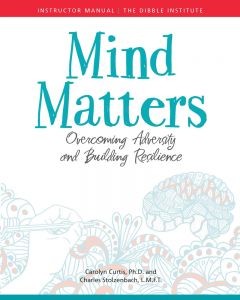
Utilizing Mind Matters: Overcoming Adversity and Building Resilience in your professional development will help to integrate a trauma informed approach into your organization, partnerships, and community systems.
It will:
- Educate your staff and partners about trauma and the paths for recovery;
- Help your staff recognize the signs and symptoms of trauma in youth, families, staff, and others;
- Giving your staff the tools to integrate knowledge about and response to trauma into your practices
- Help avoid re-traumatization.
The Dibble Institute includes two hours of complimentary technical assistance (TA) with every training. Additional services may be scheduled based on your needs.
TA topics may include
- Post training review webinar
- Developing a post-training plan for successful facilitation
- Insights into risk and protective factors
- Review and oversight of adaptations to assure fidelity
- Successful implementation models in schools and youth development programs
- Identifying referral resources
- Creating realistic recruitment and retention plans
- Sustainability planning
- Dissemination support
- Bringing your program to scale
Training Supply List for Love Notes EBP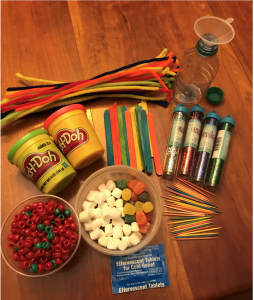
These items are also necessary when teaching the curriculum. Many of the supplies can be reused. Craft items may be found at JoAnne’s, Michael’s, or other craft store.
Assumptions: 15 participants divided into 3 groups of 5. Scale the supplies accordingly with larger or smaller groups.
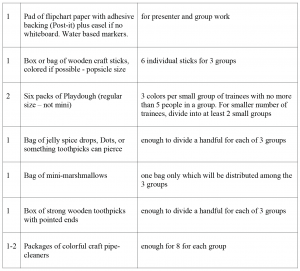
Each facilitator will need the following for instruction:
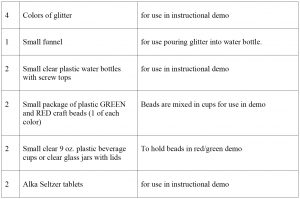
Love Notes EBP and Mind Matters

When budgeting, please add:
- 10% for shipping and handling for materials cost at or under $10,000 or 5% shipping and handling for costs over $10,000 in one order.
- your local sales tax when shipping to Arizona, California, Florida, Idaho, North Carolina, Oklahoma, Ohio, South Dakota, or Utah.
Prices subject to change at any time. Please check our website at DibbleInstitute.org or call
800-695-7975 to confirm.
Click here for the pdf file of the Love Notes EBP Price List
The Dibble Institute is pleased to sign an MOU with you as part of your application.
To help us understand your plans, please send an email Aaron@DibbleInstitute.org with the following information:
- A brief overview of your project – setting, populations targeted, proposed timing of instruction (how many hours/days/weeks), number of instructional hours
- Numbers of students you plan to serve each year of the grant.
- Recruitment/retention plan to reach 25% goal
- How you plan to implement with fidelity and what adaptations, if any, you propose.
- Your signed Budget Plan
- Optimal Health Report – National Academies of Sciences, Engineering, and Medicine
- Office of Population Affairs YouTube Channel
- TPP Tier 1 FAQs


